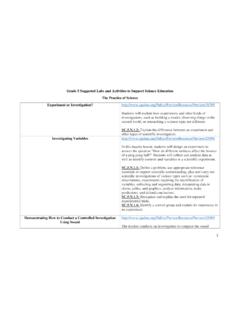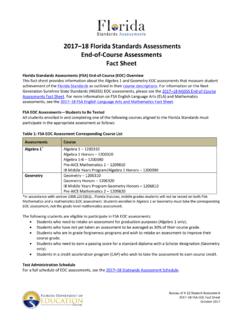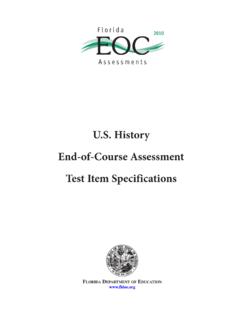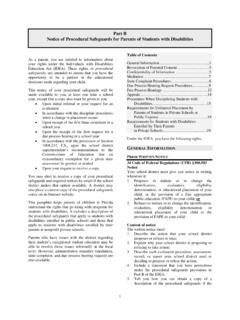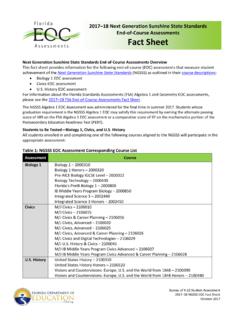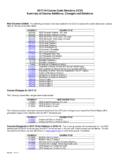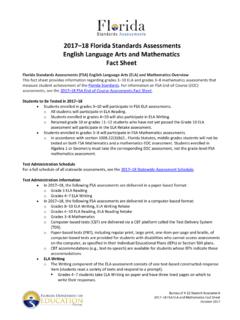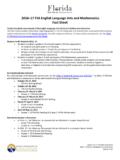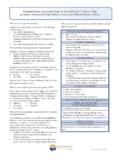Transcription of Functional Behavioral Assessment and Behavioral ...
1 1 TECHNICAL ASSISTANCE PAPERS areproduced periodically by the Bureau ofInstructional Support and Community Servicesto present discussion of current topics. The TAPapers may be used for inservice sessions,technical assistance visits, parent organizationmeetings, or interdisciplinary discussion are identified by state steeringcommittees, district personnel, and individuals,or from program compliance Number: FY 1999-3 December 1999 Division of Public Schoolsand Community EducationBureau of Instructional Supportand Community ServicesRefer Questions To:Evy Friend or Debby Houston(850) 488-1106 SC 278-1106 orPat Howard (850) 922-0045 SC 292-0045 TECHNICAL ASSISTANCE PAPERF unctional Behavioral Assessmentand Behavioral Intervention PlansRATIONALES ince the implementation of the 1997 Amendments to the Individuals with Disabilities Education Act (IDEA 97)and the subsequent regulations, the Florida Department of Education s Bureau of Instructional Support andCommunity Services (BISCS) has received numerous requests for assistance from staff members in districtexceptional education and student services programs.
2 Specifically, these staff members have asked for help indetermining their responsibilities for providing Functional Behavioral assessments (FBAs) and behavioralintervention plans (BIPs) for students with Assessment of behavior is not a new phenomenon but is based on longstanding principles of effectiveproblem solving. Although the methods are relatively new to many educators, research supports the use of thesestrategies to provide a better understanding of student behavior in educational settings and to determine thefactors leading to students Behavioral difficulties. Used largely with students identified for special educationservices, Functional Behavioral assessments and Behavioral intervention plans can play a major role in explainingand redirecting the academic and social behaviors of all students and in preventing the escalation of current concerns of district personnel are related to new wording in the law and regulations as it affectsthese assessments and interventions.
3 Federal law now places greater emphasis than before on the role of functionalbehavioral assessments and Behavioral intervention plans in serving the needs of students with , it is important to clarify the meaning of these and related terms and to see the relationship of theactivities they represent to other aspects of the law. Specifically, Functional Behavioral assessments offer valuableassistance in determining whether a specific behavior is a manifestation of the student s disability, a processreferred to as manifestation determination . However, Functional Behavioral Assessment and manifestationdetermination serve very different purposes and should not be considered equivalent or duplicative. Manifestationdetermination is required under IDEA 97 as well as Rule (6), Florida Administrative Code (FAC).This topic will be addressed more fully in a forthcoming technical assistance paper entitled DeterminingManifestation of Disability for ESE Students Being Considered for Disciplinary purpose of this technical assistance paper (TAP) is to answer recurring questions posed by school districtstaff since the implementation of the IDEA Amendments of 1997, to help school personnel understand theprocess of conducting a Functional Behavioral Assessment , and to assist district staff in planning and implementingbehavioral resources for Functional Behavioral Assessment , manifestation determination , and behavioralintervention plans are listed at the end of this TAP.
4 BISCS also disseminated to school districts a memorandumdated September 19, 1997, from the Office of Special Education and Rehabilitative Services, United StatesDepartment of Education, entitled Initial Disciplinary Guidance Related to Removal of Children with Disabilitiesfrom Their Current Educational Placement for Ten School Days or Less. This document provides further guidanceon the requirements of IDEA 97 as they relate to discipline AND is the legal authority for Functional Behavioral assessments and Behavioral interventionplans?The IDEA Amendments (20 Chapter 33) reference Functional Behavioral Assessment in Section1414, Evaluations, and in Section 1415, Procedural Safeguards. Specifically, Section 1414(b)(2)(A)states that the local education agency (LEA) shall use a variety of Assessment tools and strategies to gather relevant Functional and developmentalinformation, including information provided by the parent, that may assist in determining whetherthe child is a child with a disability.
5 Further, Section 1414(b)(2)(C) requires the use of technically sound instruments that may assess the relative contribution of cognitive andbehavioral factors, in addition to physical or developmental factors and (3)(D) assessmenttools and strategies that provide relevant information that directly assists persons in determiningthe educational needs of the child. Section 1414(d)(3)(B)(i-v) addresses the role of the IEP team in considering special factors. Part (i)states that the practitioner should in the case of a child whose behavior impedes his or her learning or that of others, consider,when appropriate, strategies, including positive Behavioral interventions, strategies, and supportsto address that behavior. Procedural safeguards are delineated in Section 1415. Specifically, Sections 1415(k)(1)(A)(i-ii) and(B)(i-ii) outline the requirements for placements in alternative educational settings, another setting, orsuspension as a result of disciplinary action.
6 Part (B)(i) and Part (B)(ii) state, If the local educational agency did not conduct a Functional Behavioral Assessment and implementa Behavioral intervention plan for such child before the behavior that resulted in agency shall convene an IEP meeting to develop an Assessment plan to addressthat behavior; or if the child already has a Behavioral intervention plan, the IEP Team shallreview the plan and modify it, as necessary, to address the behavior. is a Functional Behavioral Assessment ?A Functional Behavioral Assessment is a process for developing a useful understanding of how behaviorrelates to the environment. By knowing the function (or purpose) that the behavior serves for the student,one is able to develop an intervention that also serves that purpose, but does so through positive studentbehaviors. Intervention strategies may include effective prevention, remediation, or development ofalternative behaviors (replacement behaviors).
7 Therefore, similar behaviors should not routinely betreated with identical interventions, as the functions of the behaviors may be very different. For example,one student may fight to stop teasing by a peer; another student may fight to gain approval from a Assessment procedures typically include the following activities: review of records, including prior interventions and results interviews with individuals familiar with the student, such as family and teachers, as well as thestudent in question observations of the student s behavior in one or more settings and at various times formal and informal measurement proceduresWithin the context of the disciplinary actions cited in the response to Question 1 above, the assessmentprocedures are selected by the individual educational plan (IEP) team based on the behaviors and theunique characteristics of the student ( , physical impairments, limited English proficiency, chronichealth problems). In addition, the more severe the behavior and complex the circumstances, the greaterwill be the degree of precision and thoroughness that is required in the Assessment process.
8 FBAs varyin rigor. Specifically, there is a direct relationship between the degree of the Behavioral problem and thebehavioral Assessment resources required to address the must a Functional Behavioral Assessment be conducted?Based on Section 1415(k)(1)(B) of IDEA and on 34 , if a disciplinary action is beingconsidered for a student with a disability that would result in a change of placement (defined as (a) theremoval is for more than 10 consecutive schools days; or (b) the child is subjected to a series of removalsthat constitute a pattern because they cumulate to more than 10 school days in a school ), one ofthe following must have been completed by the IEP team either before or not later than 10 days aftertaking the disciplinary action: development of a plan for conducting an FBA and development of interim interventions review of the student s Behavioral intervention plan that has already been developed and modificationof the plan as necessary to address the student s school districts required to obtain parental consent for the FBA for disciplinary orbehavioral intervention planning with a student with disabilities under IDEA?
9 Yes, parental consent is required for the FBA of students with disabilities under IDEA. If a change ofplacement (as defined in #3) will occur, the IEP team must develop a plan for the FBA if one has notalready been conducted. This plan must include procedures for obtaining parental consent for the , in technical assistance meetings held by the United States Department of Education, Office ofSpecial Education Programs (OSEP), it was indicated that parental consent would not be required if theIEP team, in conducting the FBA, limited the Assessment procedures to a review of existing data, includingpositive Behavioral interventions, strategies, and supports that were included in the current or earlierIEP and other existing parental consent for the FBA required for students protected under Section 504 of theRehabilitation Act?Although Section 504 does not address this particular issue, it should be noted that there is generalconsensus that mirroring the IDEA Assessment procedures and practices is recommended for studentsprotected under this parents refuse to grant consent for the FBA in disciplinary response situations, what recoursedo school districts have?
10 School districts may request a due process hearing to determine whether or not the FBA should beconducted without parental consent. This step should be included in the plan for conducting the FBAwhen a student is being removed for more than 10 cumulative days in a school year or a pattern ofremovals accumulate to more than 10 days and the FBA has not already been completed. If parentsrefuse to consent to an FBA, the district may also invoke due process districts required to obtain parental consent for the FBA of a nondisabled student who maybe at risk of disciplinary actions that may have a potential negative impact on his/her learningprogress?There are no parental consent requirements for Behavioral assessments of nondisabled students or studentswho are not suspected of having a disability. However, the FBA should include information from parents/caregivers, and a written consent form may be developed by districts to document parental involvementin the Assessment and Behavioral intervention process.
